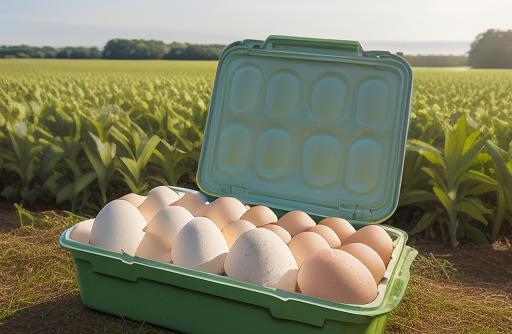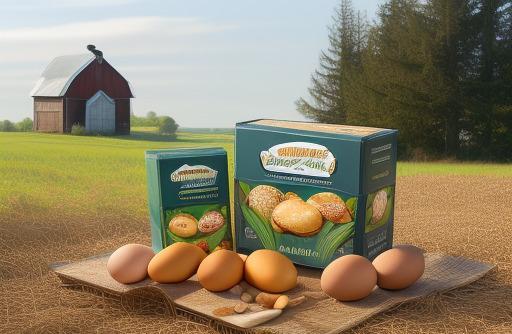- You are here:
- Home »
- Food Substitutes
- » Best Substitutes For Eggs
Best Substitutes For Eggs

Eggs are a staple ingredient in many recipes, from baked goods to breakfast dishes. However, if you follow a vegan diet, have an egg allergy, or simply run out of eggs, you may need to find a suitable substitute. Luckily, there are several excellent alternatives that can be used in place of eggs, providing similar functions and results in your favorite recipes. In this article, we will explore the best substitutes for eggs, discuss their benefits, and provide tips for using them effectively.
Key Takeaways
- Eggs are a common ingredient in cooking and baking, but there are various reasons why you may need to find a substitute.
- The best substitutes for eggs depend on the desired outcome and the recipe being prepared.
- Plant-based options like flax seeds, chia seeds, and applesauce work well as binders, while ingredients like silken tofu and yogurt can add moisture and structure to recipes.
- It’s important to choose the right substitute based on the recipe you are making and the flavor profile you desire.
- Experimenting with substitutes for eggs can lead to delicious and innovative recipes.
Why You Need A Substitute For Eggs
There are several reasons why you may need to find a substitute for eggs. Here are a few common scenarios:
-
Vegan or Plant-Based Diet: If you follow a vegan or plant-based diet, you avoid animal products, including eggs. Finding a substitute allows you to enjoy recipes while still adhering to your dietary choices.
-
Allergies: Egg allergies are relatively common, especially among children. In severe cases, even small traces of eggs can cause an allergic reaction. A suitable replacement for eggs allows individuals with allergies to consume foods without compromising their health.
-
Dietary Restrictions: Some people have dietary restrictions that limit or eliminate their consumption of eggs. Health conditions, such as high cholesterol or certain illnesses, may require individuals to reduce their intake of eggs or avoid them altogether.
-
Environmental Concerns: Producing eggs involves raising poultry, which can contribute to environmental issues like deforestation and water pollution. Substituting eggs with plant-based alternatives can reduce your carbon footprint and help mitigate these environmental impacts.
By using the right substitutes, you can still enjoy the flavors and textures eggs bring to recipes while accommodating your dietary needs or environmental values.
Types Of Substitutes For Eggs

Substitutes for eggs can be divided into different categories based on their properties and functions in cooking and baking. Here are the main types of egg substitutes:
-
Binders: Eggs often act as a binding agent, holding ingredients together in recipes such as cookies and meatloaf. Ingredients like flax seeds, chia seeds, and mashed bananas can serve as excellent binders. They create a gel-like texture when mixed with water, providing the necessary cohesion in a recipe.
-
Moisturizers: Eggs contribute moisture to recipes, preventing them from becoming dry. Substitutes like applesauce, mashed avocado, and pureed pumpkin can add moisture and richness to baked goods without the need for eggs.
-
Leavening Agents: Eggs help leaven (or lift) baked goods, making them light and fluffy. If a recipe requires leavening but you want to omit or reduce the eggs, you can use ingredients like baking powder, baking soda, or carbonated water to achieve a similar effect.
-
Structure Builders: Eggs create structure in recipes by adding stability and aeration. Ingredients like silken tofu, yogurt, and buttermilk can mimic this effect, providing structure and texture in dishes like quiches and custards.
Now that we understand the different types of substitutes, let’s explore some of the best options for replacing eggs in various recipes.
Best Substitutes For Eggs
-
Flax Seeds: Flax seeds are an excellent vegan substitute for eggs in baking. To use flax seeds as an egg substitute, mix one tablespoon of ground flax seeds with three tablespoons of water to make a "flax egg." Let it sit for about 10 minutes until it becomes thick and gelatinous. Flax eggs work best in recipes where binding is crucial, such as muffins, cakes, and pancakes.
-
Chia Seeds: Chia seeds are similar to flax seeds in terms of their binding properties. To make a chia egg, mix one tablespoon of chia seeds with three tablespoons of water and let it sit until it forms a gel-like consistency. Chia eggs work well in recipes like bread, cookies, and bars.
Pro Tip: When using flax or chia eggs, make sure to grind the seeds before mixing them with water. This will help release the beneficial nutrients and ensure a smoother texture in your recipes.
-
Applesauce: Applesauce is a versatile substitute for eggs, as it not only adds moisture but also enhances the flavor of baked goods. Replace each egg with a quarter cup of unsweetened applesauce in recipes like muffins, cakes, and quick breads. Keep in mind that applesauce can make recipes denser, so it may not be suitable for light and fluffy desserts.
-
Mashed Banana: Mashed banana works as a binding agent and provides a subtle sweetness to recipes. Use a quarter cup of mashed banana to replace each egg in recipes like pancakes, cookies, and brownies. The flavor of banana may be noticeable in the final product, so it pairs well with desserts that already have banana as an ingredient.
-
Silken Tofu: Silken tofu is an excellent replacement for eggs when you need structure and moisture in dishes like quiches, puddings, and custards. Blend a quarter cup of silken tofu until smooth and creamy, and use it as a substitute for each egg in the recipe. The tofu adds a light and silky texture while providing the necessary structure.
-
Yogurt: Yogurt serves as a suitable substitute for eggs in recipes where moistness and structure are required. Use a quarter cup of plain yogurt to replace each egg in recipes like muffins, cakes, and bread. Opt for dairy-free yogurt if you follow a vegan or lactose-free diet.
-
Buttermilk: Buttermilk is suitable for recipes that require eggs for structure and moisture. It works well in dishes like pancakes, waffles, and quick breads. To substitute for each egg, combine a quarter cup of buttermilk with half a teaspoon of baking powder. The acid in the buttermilk reacts with the baking powder, creating leavening and structure.
These substitutes provide similar properties and functions to eggs in various recipes, allowing for delicious results while accommodating dietary needs and preferences.
Choosing The Right Substitute For Eggs

When selecting a substitute for eggs, it’s important to consider the recipe you are making and the desired outcome. Here are a few factors to keep in mind:
-
Flavor Profile: Some substitutes, like mashed banana or applesauce, can add their own flavors to a recipe. Make sure the substitute complements the other ingredients in your dish.
-
Texture and Moistness: Eggs contribute to the moisture and texture of recipes. Consider the desired outcome of your recipe and choose a substitute that can provide similar moisture and texture characteristics.
-
Leavening: If a recipe explicitly requires eggs for leavening and you want to avoid them, you may need to use alternative leavening agents like baking powder or baking soda.
-
Allergies and Dietary Preferences: Take into account any dietary restrictions or food allergies when choosing an egg substitute. Ensure your chosen substitute aligns with your dietary needs and preferences.
By considering these factors, you can select the most suitable substitute for eggs that will yield the desired results in your recipes.
Cooking With Substitutes For Eggs
Using a substitute for eggs requires a slightly different approach when cooking or baking. Here are a few tips to keep in mind:
-
Follow the Ratios: Substitute the correct amount of substitute for each egg in a recipe. Many substitutes can be used in a one-to-one ratio, but make sure to check specific recipes or consult a conversion chart for guidance.
-
Consider Thickness and Consistency: Pay attention to the thickness or consistency of your substitute when preparing it. This can affect the final texture and structure of your dish. For example, if you are using flax eggs, ensure they have a gel-like consistency before incorporating them into your recipe.
-
Experiment and Adapt: Every recipe is different, and some trial and error may be required to find the perfect substitute. Don’t be afraid to experiment and adapt recipes to suit your needs. Keep notes on your substitutions and adjustments to refine your technique over time.
-
Test for Doneness: Some recipes may require a longer or shorter baking time when using substitutes for eggs. Use a toothpick or cake tester to check for doneness before removing your baked goods from the oven. Adjust the baking time as needed.
By following these tips, you can confidently incorporate substitutes for eggs into your favorite recipes and successfully achieve delicious results.
Recipes Using Substitutes For Eggs

Now that you are familiar with the best substitutes for eggs and how to use them, here are a few recipe ideas to get you started:
Vegan Flax Pancakes
Ingredients:
- 2 tablespoons ground flax seeds
- 6 tablespoons water
- 1 cup all-purpose flour
- 1 tablespoon sugar
- 1 teaspoon baking powder
- 1/2 teaspoon baking soda
- 1 cup non-dairy milk
Instructions:
- In a small bowl, whisk together the ground flax seeds and water. Set aside for about 10 minutes until it thickens.
- In a separate bowl, combine the flour, sugar, baking powder, and baking soda. Whisk to combine.
- Add the flax mixture and non-dairy milk to the dry ingredients. Stir until just combined, avoiding overmixing.
- Heat a non-stick skillet or griddle over medium heat. Pour 1/4 cup of batter onto the skillet for each pancake.
- Cook until bubbles form on the surface and the edges look set, then flip and cook for an additional 1-2 minutes. Repeat with the remaining batter.
- Serve the pancakes warm with your favorite toppings, such as fresh fruit or maple syrup.
Chia Seed Pudding
Ingredients:
- 2 tablespoons chia seeds
- 1/2 cup plant-based milk (e.g., almond milk, coconut milk)
- 1 tablespoon sweetener of choice (e.g., maple syrup, honey, agave nectar)
- 1/2 teaspoon vanilla extract
- Optional toppings: fresh berries, shredded coconut, nuts
Instructions:
- In a jar or bowl, combine the chia seeds, plant-based milk, sweetener, and vanilla extract.
- Stir well to combine and ensure the chia seeds are evenly distributed.
- Cover the jar or bowl and refrigerate overnight or for at least 4 hours until the mixture thickens and the chia seeds expand.
- Before serving, stir the pudding to ensure it is evenly mixed. If desired, add additional milk to adjust the consistency.
- Serve the chia seed pudding chilled, topped with your favorite toppings.
Applesauce Muffins
Ingredients:
- 1 1/2 cups all-purpose flour
- 1 teaspoon baking powder
- 1/2 teaspoon baking soda
- 1/2 teaspoon ground cinnamon
- 1/4 teaspoon salt
- 3/4 cup unsweetened applesauce
- 1/2 cup brown sugar
- 1/4 cup vegetable oil
- 1/4 cup non-dairy milk
- 1 teaspoon vanilla extract
Instructions:
- Preheat the oven to 350°F (175°C) and line a muffin tin with paper liners.
- In a large bowl, whisk together the flour, baking powder, baking soda, cinnamon, and salt.
- In a separate bowl, combine the applesauce, brown sugar, vegetable oil, non-dairy milk, and vanilla extract. Mix well.
- Pour the wet ingredients into the dry ingredients and stir until just combined. Avoid overmixing.
- Divide the batter evenly among the prepared muffin cups, filling each about three-quarters full.
- Bake for 18-20 minutes or until a toothpick inserted into the center of a muffin comes out clean.
- Allow the muffins to cool in the tin for a few minutes, then transfer them to a wire rack to cool completely.
These recipes showcase the versatility and deliciousness of substitutes for eggs, allowing you to enjoy various dishes without compromising flavor or texture.
Storage And Shelf Life Of Substitutes
When using substitutes for eggs, it’s essential to consider their storage and shelf life. Here are a few guidelines:
-
Flax Eggs and Chia Eggs: Once prepared, flax eggs and chia eggs should be used immediately. They do not keep well and can lose their binding properties if stored for too long.
-
Applesauce and Mashed Banana: Unused applesauce and mashed banana can be stored in an airtight container in the refrigerator for up to 5 days. However, the consistency of applesauce may change slightly upon storage.
-
Silken Tofu and Yogurt: Leftover silken tofu and yogurt should be tightly covered and stored in the refrigerator. They can be used within 3-5 days, depending on their expiration dates.
-
Buttermilk: Any leftover buttermilk can be stored in the refrigerator for up to one week. Remember to shake or stir it well before using it in subsequent recipes.
By following these storage guidelines, you can maximize the shelf life of your substitutes and minimize waste.
Conclusion
Finding the best substitutes for eggs allows you to cater to various dietary needs, including vegan or plant-based diets and egg allergies. Whether you choose to use flax seeds, chia seeds, applesauce, mashed banana, silken tofu, yogurt, or buttermilk, there are plenty of options to replace eggs in your favorite recipes. By considering the desired outcome, experimenting, and adapting recipes, you can successfully create delicious dishes without compromising flavor or texture. So go ahead and explore the world of egg substitutes – your taste buds will thank you!
Pro Tip: When substituting eggs in recipes, it’s crucial to keep in mind that the texture and taste may vary slightly compared to the original recipe. Nonetheless, experimenting with different substitutes can lead to unique and delightful culinary creations.
FAQS
What Are Some Of The Best Substitutes For Eggs In Baking?
There are several plant-based ingredients that can be used as substitutes for eggs in baking, including mashed bananas, applesauce, yogurt, silken tofu, and aquafaba (the liquid from a can of chickpeas).
Can I Use Chia Or Flax Seeds As Egg Substitutes In Baking?
Yes, chia and flax seeds can be used as egg substitutes in baking. To use chia seeds, simply mix 1 tablespoon of ground chia seeds with 3 tablespoons of water for each egg. For flax seeds, mix 1 tablespoon of ground flax seeds with 3 tablespoons of water for each egg.
Are There Any Commercial Egg Substitutes Available In The Market?
Yes, there are several commercial egg substitutes available in the market, such as Ener-G Egg Replacer, Bob’s Red Mill Egg Replacer, and Follow Your Heart VeganEgg. These egg substitutes are typically made from a blend of plant-based ingredients, such as potato starch, tapioca starch, and baking powder.
Which Egg Substitute Is The Best For Making Vegan Omelettes Or Scrambled Eggs?
Silken tofu is one of the best substitutes for eggs in making vegan omelettes or scrambled eggs. Simply blend 1/4 to 1/3 cup of silken tofu with a pinch of turmeric for color and some salt and pepper to taste. You can also add vegetables and cheese alternatives for added flavor.
Can I Use Vinegar As An Egg Substitute In Baking?
Yes, vinegar can be used as an egg substitute in baking. Mix 1 tablespoon of white vinegar or apple cider vinegar with 1 teaspoon of baking powder for each egg. This substitute works best in recipes that call for more than one egg and need a leavening agent.
Sources
About the Author Jenny
I'm Jenny, a housewife with an unwavering passion for food. My culinary journey began with my grandmother's kitchen, and it's now a full-fledged food blog. I've turned my love for cooking into a creative outlet, sharing recipes and stories with a global community of fellow food enthusiasts. It's proof that being a housewife can also mean pursuing your passions and savoring life's delectable moments.
